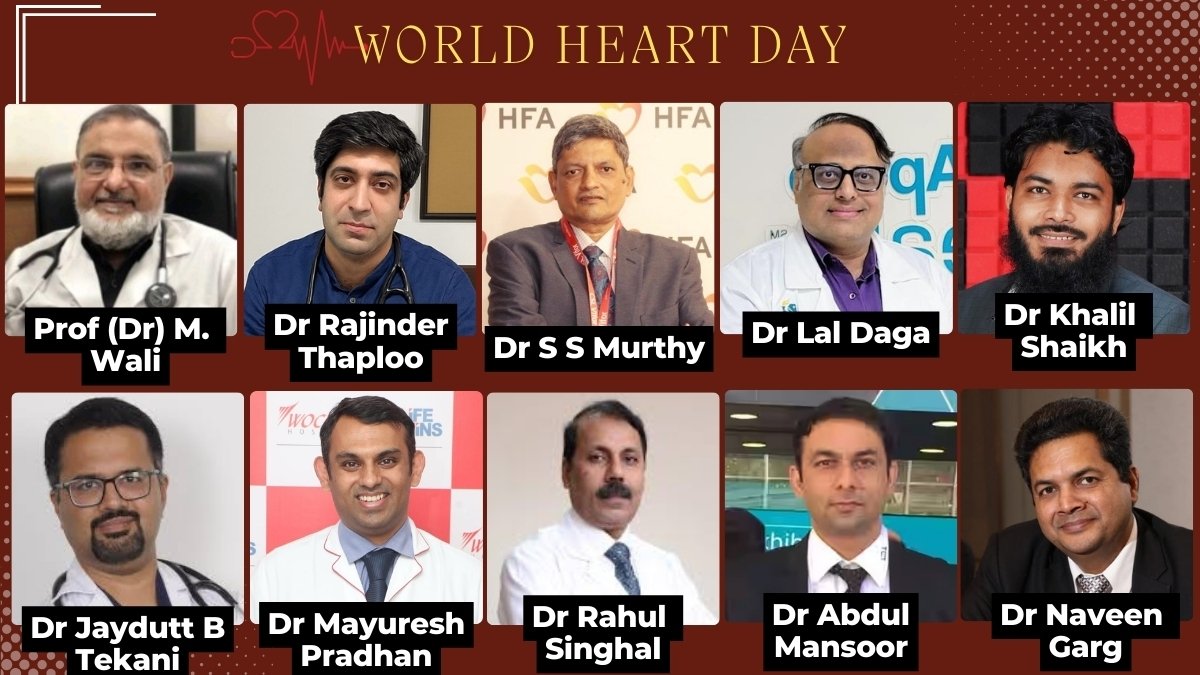New Delhi [India], September 29: Heart disease is no longer a condition of the elderly—it is alarmingly affecting people in their 20s, 30s, and 40s. Sedentary lifestyles, stress, unhealthy diets, and late diagnoses are driving a surge in cardiac cases among the young. On this World Heart Day 2025, leading cardiologists share their insights, highlighting why timely awareness, early screening, and preventive action are critical to protecting heart health before it’s too late.
1. Prof. (Dr) M. Wali
MD FRCP FACC (USA), Sir Ganga Ram Hospital, New Delhi
Padma Shri Dr. Mohsin Wali, a distinguished cardiologist, stands as one of the most respected figures in Indian medicine. His remarkable journey began with the rare honor of becoming the youngest physician to serve an Indian President. Over the course of his career, he has achieved an unparalleled distinction—being the only physician to have served three Presidents of India. This unique achievement reflects his exceptional expertise, commitment, and service to the nation.
Recognized with the prestigious Padma Shri Award in 2007, Dr. Wali has made immense contributions to advancing cardiology and medicine in India. His dedication to patient care, medical innovation, and clinical excellence continues to inspire generations of doctors and healthcare professionals. Beyond his clinical accomplishments, Dr. Wali embodies compassion, vision, and leadership, qualities that make him not only a healer but also a role model in Indian healthcare. His journey remains a testament to perseverance and service.
2. Dr. Rahul Singhal
Director – Cardiology and Cardiac Electrophysiology at Fortis Hospital Jaipur
Dr. Rahul Singhal, Director of Cardiology, Jaipur, stresses that heart disease is no longer just a concern for the elderly—it is rapidly affecting young adults, often without any warning. According to him, modern lifestyles marked by high stress, processed foods, smoking, alcohol consumption, and lack of exercise are silently damaging young hearts at an alarming rate.
He has observed that many young patients tend to ignore early warning signs such as fatigue, chest discomfort, palpitations, or breathlessness, believing they are too young to face cardiac issues. This, he cautions, is a dangerous assumption that can lead to sudden cardiac events or irreversible damage.
Dr. Singhal’s advice is clear: do not wait for a crisis. Prioritize regular health check-ups, maintain a balanced diet, exercise at least 30 minutes daily, and manage stress proactively. Even small lifestyle changes—quitting tobacco, limiting alcohol, incorporating yoga, meditation, or mindfulness—can significantly reduce risk.
On this World Heart Day, he urges everyone to commit to healthier habits and spread awareness, wishing all a strong and healthy heart.
3. Dr. Lal Daga
MBBS, DNB (Med.), DNB (Card) MNAMS, FESC (International), FEAC, Advanced Cardiology Training Programme (Seoul), Senior Consultant Interventional Cardiologist at Apollo Hospital, Ahmedabad
Dr. Lal Daga emphasizes that heart disease is no longer just a concern for the elderly—it is rising rapidly among the young. Stressful lifestyles, lack of exercise, unhealthy diets, and late diagnosis are putting today’s youth at serious risk. Waiting until symptoms appear can be dangerous, as heart conditions often progress silently. If you have diabetes, hypertension, high cholesterol, a family history of coronary artery disease, or a smoking habit, it is essential to get your heart health evaluated in advance.
His advice is simple: adopt preventive measures early. Regular exercise, balanced nutrition, avoiding tobacco and alcohol, and routine health check-ups are not just recommendations—they are lifesaving habits. Awareness and timely action, especially when risk factors or early signs of heart illness are present, can protect our hearts and save countless lives.
On this World Heart Day, Dr. Daga urges everyone to pledge to prioritize heart health—not only for ourselves but also for our families and future generations.
4. Dr. Rajinder Thaploo
MBBS, MD (Medicine), DNB (Cardiology), FSCAI, FISC, FAPSIC, Senior Interventional Cardiologist & Cath Lab Director
Heart disease is striking young Indians with alarming frequency. Heart attacks in the 20s and 30s are no longer rare. Stressful lifestyles, erratic diets, smoking, and prolonged inactivity are silently pushing a generation towards premature heart disease.
The tragedy is not just the illness—but the delay. Too often, warning signs like chest pain, palpitations, or unexplained fatigue are brushed aside until it is too late. In my practice, I have seen young lives cut short simply because medical help was sought late. In cardiology, time lost is heart lost—and sometimes, life lost.
The way forward is awareness and prevention. Regular exercise, balanced nutrition, quitting tobacco, stress control, and periodic health checks are essential. Equally important is to act on early symptoms without hesitation.
This World Heart Day, let us pledge: don’t wait for tomorrow to protect your heart—the time is now.
5. Dr. S. S. Murthy
Director & HOD – Cardiology, Ayushman Hospital and Health Services, New Delhi
Dr. S. S. Murthy emphasizes that heart problems among young adults (20–44 years) are rising at an alarming pace. Multiple factors contribute to this trend. Obesity and diabetes are increasing sharply—between 2009 and 2020, obesity rates in young adults rose from 32.7% to 40.9%, while diabetes cases climbed from 3% to 4.1%. Hypertension, now affecting 1 in 10 young adults, can cause thickening of the heart muscle, damage blood vessels, and elevate heart attack risk. Smoking one pack a day doubles the risk, while vaping raises it by 34%. Chronic stress, lack of exercise, genetic predisposition, and post-COVID complications have further added to the burden.
Dr. Murthy highlights the importance of calculating a risk score for every individual, based on age, cholesterol, blood pressure, diabetes, and smoking history. Those in intermediate or high-risk groups must adopt preventive measures—maintaining healthy weight, regular exercise, stress management, avoiding tobacco and vaping, and undergoing routine health check-ups. Timely awareness and action can significantly lower risks and safeguard heart health in the young.
6. Dr. Mayuresh Pradhan
Chief Cardiac Surgeon Wockhardt Hospital, Mira Road, Mumbai, MCH CVTS KEM Hospital Mumbai, Fellowship in Advanced CVTS – Apollo Hospital Chennai, Cardiac Transplant and Advanced CVTS Fellowship, Auckland New Zealand
As a cardiac surgeon, I am deeply concerned by the sharp rise in heart disease among the young. What was once considered a problem of the 50s and 60s is now striking in the 20s and 30s. Studies show that nearly half of heart attack cases in India today occur in people under 40. The reasons are many—stress, irregular lifestyles, poor diet, lack of exercise, and the habit of ignoring early warning signs. I have seen young professionals, full of promise, suddenly land in the operating room with life-threatening heart disease. The most dangerous mistake is waiting—waiting for symptoms to get worse, waiting to ‘find time’ for a check-up, or waiting to make lifestyle changes. On this World Heart Day, my message is simple: do not wait. Get screened early, make heart-healthy choices today, and take small steps that protect your future. Because when it comes to your heart, waiting can cost a lifetime.
7. Dr. Abdul Mansoor
Interventional Cardiologist, Mangalore
Heart disease is no longer just a concern of the elderly — it is rising rapidly among the younger population. Stressful routines, irregular sleep, lack of exercise, smoking, alcohol, and unhealthy food habits are silently damaging heart health. The most dangerous part is that symptoms often appear late, when the disease has already progressed.
My strong advice is to take prevention seriously. A healthy heart is built through small but consistent steps — eating a balanced diet, staying physically active, practicing stress management, avoiding tobacco and alcohol, and going for regular health check-ups. These are not optional lifestyle tips, they are essential habits to save lives.
World Heart Day is a reminder that waiting can be dangerous. Let’s not ignore the warning signs and instead make timely choices that secure our heart health for the future. By taking care of ourselves today, we also protect the well-being of our families and future generations.
Let us pledge to keep our hearts stronger, healthier, and happier.
8. Dr. Jaydutt B Tekani
MBBS, MD, DNB Cardiology, FSCAI, FESC, Senior Consultant Interventional Cardiologist – K K Patel Super Speciality Hospital, Bhuj, Gujarat
Heart disease is no longer a condition confined to the elderly; alarmingly, we are seeing a sharp rise among people in their 20s, 30s, and 40s. The modern lifestyle—sedentary habits, high stress, poor diet, lack of sleep, and rising obesity—has accelerated this trend. The danger lies not only in the disease itself but also in the delay—most young individuals ignore early warning signs, attributing chest discomfort, fatigue, or palpitations to stress or exhaustion. This hesitation can cost precious time, turning treatable conditions into life-threatening emergencies. The good news is that heart health can be safeguarded with conscious choices: regular exercise, balanced nutrition, stress management, timely health check-ups, and avoiding tobacco and excess alcohol. My appeal to the youth is simple—don’t wait for tomorrow to care for your heart. Prevention started today is far more powerful than treatment delayed tomorrow. On this World Heart Day, let us remember that a strong, healthy heart is the foundation for a longer, fuller life.
9. Dr. Khalil Saikh
Interventional Cardiologist, Mumbai
Heart attacks among young adults are becoming increasingly common, a concerning trend that has been observed globally, including in India. Risk factors include Sedentary Lifestyle, Obesity and Diabetes Smoking , Vaping and stress. SCAD , coronary spam and stress induced cardiomyopathy are other than traditional cause of heart attack . Early detection and prevention of heart attack is necessary . “Time is muscle” is a crucial concept in cardiology, emphasizing that prompt treatment during a heart attack (acute myocardial infarction) is essential because lost time leads to a greater loss of heart muscle, which can result in permanent damage, complications, or even death. Every minute counts: the longer the blockage, the more heart muscle is permanently damaged.
Preventive care is more effective early on
- Screening tests (ECG, lipid profile, 2D Echo etc.) can catch risk factors before they cause serious damage.
- Once advanced symptoms appear, treatment options are more limited and outcomes worse. Waiting is dangerous because heart disease is often silent until it’s too late. Acting early — recognizing symptoms, getting tested, and making lifestyle changes — can save lives.
10. Dr. Naveen Garg
Incharge in the Department of Cardiology, Faridabad
Dr. Naveen Garg emphasizes that the theme of this World Heart Day, “Never Miss a Beat,” is particularly relevant to India. The country is home to a large Gen-Z and Gen-Alpha population, who also faces a growing burden of heart disease. Evidence shows that death related to heart diseases are increasingly prevalent among younger age groups. This paradigm shift from an old-age disease to one affecting the young raises serious questions about lifestyle.
Our technology-driven lives have made us physically weaker. Dr. Garg stresses the importance of “pausing” for one’s health—every beat of the heart should be healthy and productive. Regular visits to a cardiologist, nutritionist, and psychologist are essential. Maintaining a balanced mind and heart, through good nutrition, yoga, social connections, and routine health check-ups, is critical.
He warns that virtual lifestyles, sedentary habits, stress, poor nutrition, and loneliness are causing young people to “miss” their heartbeats. To stay healthy and live better, this generation must reconnect with the real world and never miss any beat.
If you have any objection to this press release content, kindly contact pr.error.rectification@gmail.com to notify us. We will respond and rectify the situation in the next 24 hours.


Comments are closed.